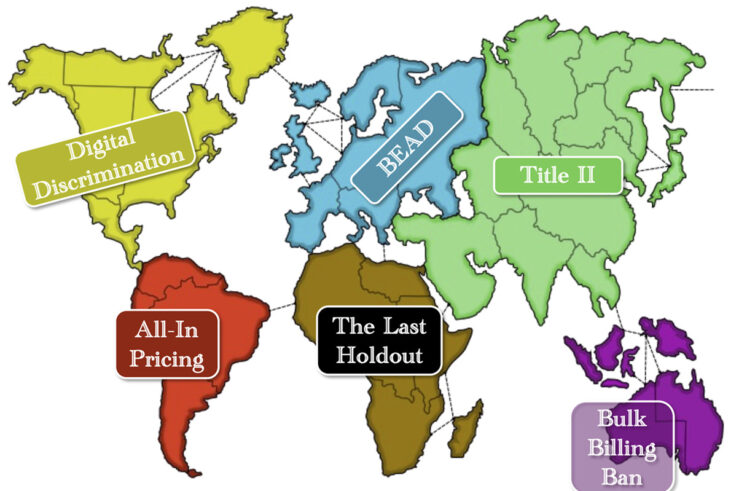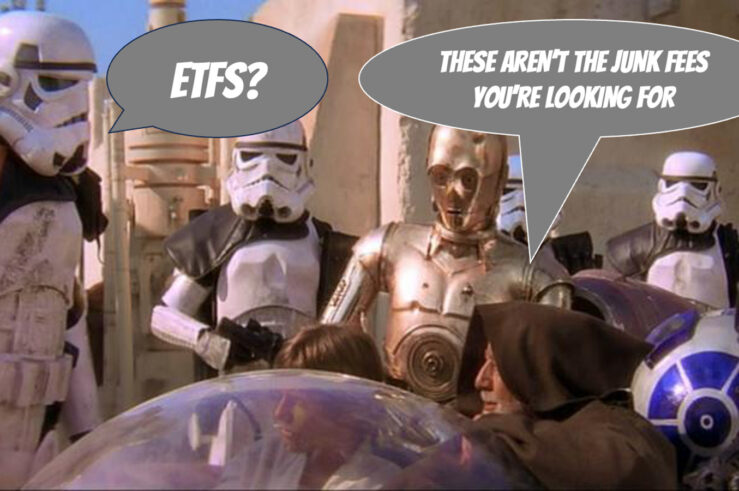Will the Courts Allow the FCC to Execute One More Title II Flip Flop?
The U.S. Supreme Court’s recent decision in Loper Bright v. Raimondo may have added a new wrinkle to the decades-long fight over whether broadband internet-access services should be classified as “telecommunications services” under Title II of the Communications Act. The Federal Communications Commission (FCC) has flip-flopped multiple times over the years on this hotly debated ... Will the Courts Allow the FCC to Execute One More Title II Flip Flop?
FCC’s Digital-Discrimination Rules: Bridging the Divide or a Bridge Too Far?
The Federal Communications Commission’s (FCC) recently enacted rules to prevent so-called “digital discrimination” in broadband access are facing a significant legal challenge in the 8th U.S. Circuit Court of Appeals. Earlier this week, the U.S. Justice Department and the FCC submitted their brief on the matter. Now that the parties have made their “opening arguments” ... FCC’s Digital-Discrimination Rules: Bridging the Divide or a Bridge Too Far?
Clearing the Telecom Logjam: A Modest Proposal
In this “Age of the Administrative State,” federal agencies have incredible latitude to impose policies without much direction or input from Congress. President Barack Obama fully pulled off the mask in 2014, when he announced “[w]e are not just going to be waiting for legislation,” declaring “I’ve got a pen, and I’ve got a phone.” ... Clearing the Telecom Logjam: A Modest Proposal
It’s Risk, Jerry, The Game of Broadband Conquest
The big news in telecommunications policy last week wasn’t really news at all—the Federal Communications Commission (FCC) released its proposed rules to classify broadband internet under Title II of the Communications Act. Supporters frame the proposed rules as “net neutrality,” but those provisions—a ban on blocking, throttling, or engaging in paid or affiliated-prioritization arrangements—actually comprise ... It’s Risk, Jerry, The Game of Broadband Conquest
Section 214: Title II’s Trojan Horse
The Federal Communications Commission (FCC) has proposed classifying broadband internet-access service as a common carrier “telecommunications service” under Title II of the Communications Act. One major consequence of this reclassification would be subjecting broadband providers to Section 214 regulations that govern the provision, acquisition, and discontinuation of communication “lines.” In the Trojan War, the Greeks ... Section 214: Title II’s Trojan Horse
Blackout Rebates: Tipping the Scales at the FCC
Cable and satellite programming blackouts often generate significant headlines. While the share of the population affected by blackouts may be small—bordering on minuscule—most consumers don’t like the idea of programming blackouts and balk at the idea of paying for TV programming they can’t access. Enter the Federal Communications Commission (FCC) with a bold proposal to ... Blackout Rebates: Tipping the Scales at the FCC
FCC’s Digital-Discrimination Rules: An Open Invitation to Flood the Field with Schlock
A half-dozen lawsuits have been filed to date challenging the digital-discrimination rules recently approved by the Federal Communications Commission (FCC). These cases were consolidated earlier this month and will now be heard by the 8th U.S. Circuit Court of Appeals. This has the hallmarks of a significant case that will almost certainly involve the U.S. ... FCC’s Digital-Discrimination Rules: An Open Invitation to Flood the Field with Schlock
Are Early-Termination Fees ‘Junk’ Fees?
Cable and satellite companies often get a bad rap for early termination fees (ETFs). Consumer advocates portray them as “junk fees” or billing traps meant to cheat customers. And the Federal Communications Commission (FCC) appears to accept these allegations at face value, characterizing ETFs as “junk fee billing practices … that penalize subscribers for terminating ... Are Early-Termination Fees ‘Junk’ Fees?
The Curious Case of the Missing Data Caps Investigation
In an announcement that was treated to mild fanfare (meaning it was reported by certain tech blogs, but largely ignored elsewhere), Federal Communications Commission (FCC) Chair Jessica Rosenworcel asked her fellow commissioners in June 2023 to support a formal notice of inquiry (NOI) to learn more about how broadband providers use data caps on consumer ... The Curious Case of the Missing Data Caps Investigation
Slouching Toward Disconnection and the End of the ACP
It’s our first post of the New Year, and we’re having a hard time feeling the Hootenanny vibes. Rather than Congress taking a “new year, new you” approach to telecom policy, it seems that D.C. is starting the year with the “same old, same old” of brinkmanship. This time, with broadband subsidies. The Affordable Connectivity ... Slouching Toward Disconnection and the End of the ACP
A Holiday Hootenanny Hiatus, But First, Some Title II Talk
For those of who’ve been doing the Telecom Two-Step over the past year, the holiday break can’t come soon enough. Last week, comments were due on the Federal Communications Commission’s (FCC) latest proposal to impose Title II common-carrier regulation under the guise of net neutrality national security. Before that, we had the FCC’s new and ... A Holiday Hootenanny Hiatus, But First, Some Title II Talk
Has the Biden Administration Taken Over Broadband?
Betteridge’s Law of Headlines states: “Any headline that ends in a question mark can be answered by the word no.” But, apparently, folks in the nation’s capital found a way around Betteridge’s Law. This week, a U.S. House subcommittee hearing featured testimony from all five members of the Federal Communications Commission (FCC). The majority on ... Has the Biden Administration Taken Over Broadband?
















